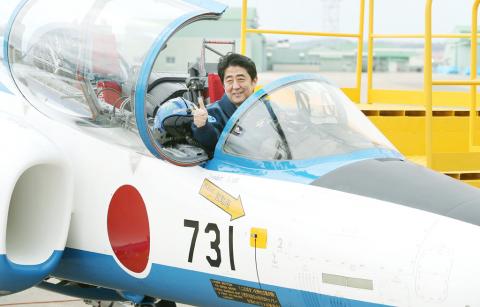Major South Korean newspapers splashed a photograph of Japanese Prime Minister Shinzo Abe in a military trainer jet on their front pages yesterday, saying it was a reminder of Japan’s colonial-era atrocities.
The picture in question showed a smiling Abe giving a thumbs-up while sitting in the cockpit of an Japan Air Self-Defense Force T-4 training jet emblazoned with the number 731.
The number evoked memories of Unit 731 — a covert Japanese biological and chemical warfare research facility that carried out lethal human experiments during the 1937-1945 Sino-Japanese War and World War II.

Photo: AFP
The unit was based in the northeastern Chinese city of Harbin and it held prisoners from China, Korea and the Soviet Union.
The press in Seoul suggested the Abe picture was an intended affront to countries such as China and South Korea, which suffered under Japanese occupation.
“Abe’s endless provocation,” said a picture caption on the front page of the country’s largest daily, the Chosun Ilbo.
“Abe’s pose resurrects horrors of Unit 731,” ran the headline in the English-language Korea JoongAng Daily.
The picture was taken on Sunday at an air force base in Miyagi Prefecture. Abe was visiting the base as part of a tour of areas affected by the 2011 earthquake and tsunami.
The Japanese Ministry of Defense suggested the number on the trainer was simply coincidental.
“There was no particular meaning in the number of the training airplane the prime minister was in on Sunday. Other than that there is nothing we can say,” a ministry spokesman said in Tokyo.
South Korean Ambassador to Japan Shin Kak-soo said he knew of nothing that indicated there was any intent behind the use of a plane numbered 731, but that Japan needed to pay attention to perceptions.
Likening Japan’s sticky relationship with its neighbors to that between a school bully and his victims, he said: “There is a gap between the perception of a victimizer and that of a victim.”
He said Japanese empathy toward Koreans on history “would prompt a faster curing of wounds.”
The prominence given to the photo will likely fuel public anger in South Korea, which has already been aroused by the recent visit by Japanese Cabinet ministers and lawmakers to the Yasukuni Shrine.

CHAOS: Iranians took to the streets playing celebratory music after reports of Khamenei’s death on Saturday, while mourners also gathered in Tehran yesterday Iranian Supreme Leader Ayatollah Ali Khamenei was killed in a major attack on Iran launched by Israel and the US, throwing the future of the Islamic republic into doubt and raising the risk of regional instability. Iranian state television and the state-run IRNA news agency announced the 86-year-old’s death early yesterday. US President Donald Trump said it gave Iranians their “greatest chance” to “take back” their country. The announcements came after a joint US and Israeli aerial bombardment that targeted Iranian military and governmental sites. Trump said the “heavy and pinpoint bombing” would continue through the week or as long

TRUST: The KMT said it respected the US’ timing and considerations, and hoped it would continue to honor its commitments to helping Taiwan bolster its defenses and deterrence US President Donald Trump is delaying a multibillion-dollar arms sale to Taiwan to ensure his visit to Beijing is successful, a New York Times report said. The weapons sales package has stalled in the US Department of State, the report said, citing US officials it did not identify. The White House has told agencies not to push forward ahead of Trump’s meeting with Chinese President Xi Jinping (習近平), it said. The two last month held a phone call to discuss trade and geopolitical flashpoints ahead of the summit. Xi raised the Taiwan issue and urged the US to handle arms sales to

A magnitude 5.6 earthquake struck off the coast of Yilan County at 12:37pm today, with clear shaking felt across much of northern Taiwan. There were no immediate reports of damage. The epicenter of the quake was 16.9km east-southeast of Yilan County Hall offshore at a depth of 66.8km, Central Weather Administration (CWA) data showed. The maximum intensity registered at a 4 in Yilan County’s Nanao Township (南澳) on Taiwan’s seven-tier scale. Other parts of Yilan, as well as certain areas of Hualien County, Taipei, New Taipei City, Taoyuan, Hsinchu County, Taichung and Miaoli County, recorded intensities of 3. Residents of Yilan County and Taipei received

Taiwan has secured another breakthrough in fruit exports, with jujubes, dragon fruit and lychees approved for shipment to the EU, the Ministry of Agriculture said yesterday. The Animal and Plant Health Inspection Agency on Thursday received formal notification of the approval from the EU, the ministry said, adding that the decision was expected to expand Taiwanese fruit producers’ access to high-end European markets. Taiwan exported 126 tonnes of lychees last year, valued at US$1.48 million, with Japan accounting for 102 tonnes. Other export destinations included New Zealand, Hong Kong, the US and Australia, ministry data showed. Jujube exports totaled 103 tonnes, valued at